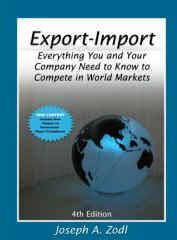
Export Compliance
by
Joseph Zodl
© 2001 Joseph Zodl
(excerpted from remarks to International Import-Export Institute,
Phoenix, Arizona, June 12, 2001)
Export is a serious business to the United States government in terms of export licensing, export declarations, and other aspects of compliance.
Even some very large companies have been assessed large penalties for violations. Sample cases are here.
Responsibility for export compliance is very difficult to delegate. The regulations define a U.S. Principal Party in Interest (USPPI) as that party in the United States who benefits most from the export transaction and further states that the USPPI is responsible for export compliance.
The one exception is a Routed Export Transaction which many companies may find more trouble than it is worth. This is an authorization by the foreign buyer of U.S. entity, such as a freight forwarder or a U.S. subsidiary. as the party authorized to undertake export compliance on their behalf. This makes the forwarder or subsidiary responsible for export compliance providing certain steps are followed and makes possible an Ex Works sale. However, there are many steps involved and it remains up to the USPPI to provide the information necessary to arrange export clearance. The Routed Export Transaction is a new procedure as of the year 2000, and is not yet tested in the courts. Generally, I recommend against using it at this time.
(Note that a Routed Export Transaction is a very specific procedure, and is not the same as receiving a "routing guide" or "routing instruction" from a buyer.)
Outside of the Routed Export Transaction, it is impossible for a USPPI to delegate the responsibility for export compliance (15 CFR 758). Therefore, it is incumbent on U.S. companies to take control of these responsibilities. Sometimes, without applying the Routed Export Transaction procedures, a USPPI sells Ex Works and allows the buyer's forwarder to arrange export compliance. This puts the USPPI in the position of being responsible for something over which it has no control. (Using the seller's forwarder and buyer's carrier (who may be owned by another forwarder) is an acceptable procedure.)
Let's dispense with the Ex Works option as generally being too problematic to work with. Under the remaining twelve standard terms of sale the seller and buyer have agreed that the seller will undertake export compliance.
Export compliance includes, among other responsibilities:
Shipper's Export Declaration (when applicable).
Export Licensing (when applicable).
Adherence to U.S. embargo regulations.
Adherence to the anti-boycott regulations.
Adherence to the requirements of the Ten General Prohibitions.
There is much involved with export compliance. Since the responsibility can't be delegated (except for the narrow Routed Export Transaction procedure under an Ex Works sale), every U.S. seller must be fully aware of the regulations. The seller cannot say it was the freight forwarder's fault, whether it be the seller's forwarder or otherwise. (Although the forwarder also has a responsibility if a violation is committed, the seller's responsibility cannot be delegated to the forwarder.)
It's important to recognize the following points:
A U.S. company disclosing technical information to a foreign buyer may be already be in violation of the regulations. This may even be technical information related to making the sale, and disclosed within the United States. If the technology requires a license, a license may be needed to make a thorough sales presentation.
A U.S. company may be in violation delivering a licensable product to the U.S. subsidiary of a foreign company.
A U.S. company may be in violation for a sale made by a foreign subsidiary. An example is where a U.S. company ships to a subsidiary in France and that subsidiary ships to a customer in Libya. The U.S. company can be held responsible for not controlling its French subsidiary.
Export compliance is an extremely important area, and not something to be taken lightly. Many products that sellers might not initially think of will require licenses to some destinations. Examples are:
handcuffs (OA982).
machetes (OA988).
western red cedar lumber(1C988).
Export compliance is an important responsibility that needs to be focused on as a priority for all companies involved in export.